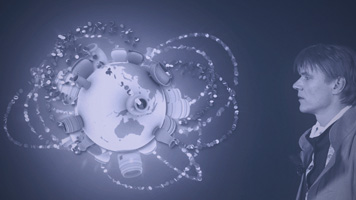Money and Time I: The genesis of modern money

The early forms of money are a stable phenomenon
Money doesn’t arrive in the world as the money we deal with today; rather, it has become that. And indeed it is not as if this is a necessary, quasi-natural development, not as if it would have steadily unfolded from simple beginnings until it eventually became as complex as our present money. The early forms of money – and that means payments and purchases with coins always used in parallel to other things – are a completely stable phenomenon. They have no need to develop further; they see no need for change, being basically only a part of economic activity that’s based on things other than money, buying and business. They were always a subordinate part of provisioning that otherwise mainly ran via self-sufficiency, via sharing or via accumulation and redistribution of goods by the powers that be.

Today's capitalistic global economy
And so it remained for centuries. Only a specific historic constellation in Western Europe ends this arrangement in the course of 16th century – and initially only there. It drives the earlier use of money beyond itself, into a state of affairs that is now "the economy," as we call it today, to make it its own area of social activity. It is in the capitalist economy that provisioning in fact proceeds chiefly through money. And this is a kind of economy that, in every country where it’s arisen, it then compels them to carry it forth into the world with a lot of violence – with corresponding success: today’s capitalistic global economy.

The main things that people do and how they live, depend on money value
This kind of economy is for the first time a blindly selfperforming system: everything it touches is mediated over a market in terms of its money value. That means the main things that people do and how they live, depend on that money value. The people don’t determine this on their own but rather are determined by it: a systematic imperative set by money. This dependence, as it relates to all economic activities and ways of provisioning, is widely extended.
It is precisely that which drives people to glorify it and the system on which they depend, and to attribute positive rationality to it: as if they themselves had opted with reason for it – instead of actually following a historically blindly arisen dependence. Indeed, precisely because it is a blind system lacking such reason, it is transfigured into a promise. Tirelessly it is claimed that, as a market with an invisible hand, the system will achieve a balance between the most contradictory tendencies and interests. Thus what has long since become ever clearer is overlaid: that this system that promises to compensate the conflicts not only doesn’t compensate, but in fact in the first place creates them.